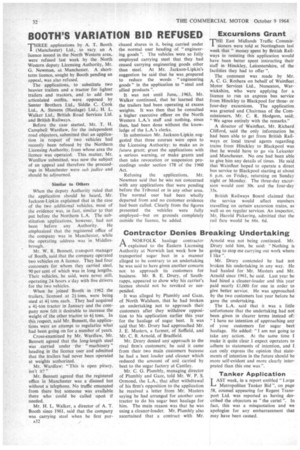BOOTH'S VARIATION BID REFUSED
Page 34

If you've noticed an error in this article please click here to report it so we can fix it.
THREE applications by A. T. Booth (Manchester) Ltd., to vary an A licence issued in the North Western area, were refused last week by the North Western deputy Licensing Authority, Mr. G. Newman, at Manchester. A shortterm licence, sought by Booth pending an appeal, was also refused.
The applications, to substitute two heavier trailers and a tractor for lighter trailers and tractors, and to add two articulated outfits, were opposed by Sunter Brothers Ltd., Siddle C. Cook Ltd., A. Stevens (Haulage) Ltd., H. L. Walker Ltd., British Road Services Ltd. and British Railways.
Before the case started, Mr. T. H. Campbell Wardlaw, for the independent road objectors, submitted that an application in respect of two vehicles had recently been refused by the Northern Licensing Authority, from whose area the licence was operated. This matter, Mr. Wardlaw submitted, was now the subject of an appeal and therefore the proceedings in Manchester were sub judice and should be adjourned.
Similar to Others When the deputy Authority ruled that the application should be heard, Mr. Jackson-Lipkin explained that in the case of the two additional vehicles, most of the evidence was, in fact, similar to that put before the Northern L.A. The substitution applications, however, had not been before any Authority. He emphasized that the registered office of the company was in Manchester, while the operating address was in Middlesbrough.
Mr. W. R. Bennett, transport manager of Booth, said that the company operated two vehicles on A licence. They had four customers for whom they carried steel, 90 per cent of which was in long lengths. Their vehicles, he said, were never still, operating 24 hours a-day with five drivers for the two vehicles.
When he joined Booth in 1962 the trailers, licensed at 2-1 tons, were being used at 4+ tons each. They had acquired a 4+-ton tractor in January and the company now felt it desirable to increase the weight of the other tractor to 41 tons. In this respect, said Mr. Bennett, the applications were an attempt to regularize what had been going on for a number of years.
Cross-examined by Mr. Wardlaw, Mr. Bennett agreed that the long-length steel was .carried under the " machinery " heading in the licence user and admitted that the trailers had never been operated at weights authorized.
Mr. Wardlaw: "This is open piracy, isn't it? "
Mr. Bennett agreed that the registered office in Manchester was a disused hut without a telephone. No traffic emanated from there but someone was available there who could be called upon if needed.
Mr. H. L. Walker, a director of A. T. Booth since 1961, said that the company was carrying steel when he first pur a32 chased shares in it, being carried under the normal user heading of "engineering goods ". The vehicles were so fully employed carrying steel that they had ceased carrying engineering goods other than steel. At Mr. Jackson-Lipkin's suggestion he said that he was prepared to reduce the words "engineering goods" in the application to "steel and allied products ".
It was not until June, 1963, Mr. Walker continued, that he learned that the trailers had been operating at excess weights. It was then that he consulted a higher executive officer on the North Western L.A.'s staff and nothing, since then, had been done without the knowledge of the L.A.'s clerks.
In submission Mr. Jackson-Lipkin suggested that three courses were open to the Licensing Authority: to make an in futura grant; grant the applications with a serious warning, or make grants and then take revocation or suspension proceedings under section 178 of the 1960 Act.
Refusing the applications, Mr. Newman said that he was not concerned with any applications that were pending before the Tribunal or in any other area. The normal user had been wholly departed from and no customer evidence had been called. Clearly from the figures presented the vehicles were fully employed—but on grounds completely outside the licence, he added.












































































































